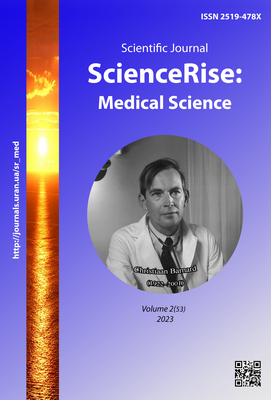Перехресне дослідження COVID-19 та психологічного дистресу з використанням шкали впливу подій, на основі спільноти пацієнтів, які одужали від COVID-19
DOI:
https://doi.org/10.15587/2519-4798.2023.281268Ключові слова:
COVID-19, шкала IES-R, ті хто пережив COVID, посттравматичний стресовий розлад, ВООЗ, SARS-CoV-2, перехресне дослідження, контакт після спалаху, медична допомогаАнотація
Інфекція COVID-19 є потенційно травматичним досвідом з точки зору ризику розвитку важкого гострого респіраторного синдрому на додаток до соціальних наслідків захворювання з точки зору ізоляції та дотримання суворих карантинних заходів з метою попередження контактів. Метою цього дослідження було оцінити поширеність психологічного дистресу та його факторів ризику у пацієнтів, у яких розвивається інфекція COVID-19. Є мізерні докази щодо масштабів психологічного дистресу (ПД), пов’язаного з COVID-19, серед населення Індії в цілому, а посттравматичний стресовий розлад (ПТСР) — це психічний розлад, який розвивається після травматичної події, що загрожує життю.
Метою цього дослідження було оцінити інфікування COVID-19 та його наслідки.
Матеріал і методи: це дослідження було проведено серед 672 осіб, які пережили COVID-19 з Будгамського району (з березня по серпень 2020 р.). З ними спілкувалися по телефону та оцінювали психологічний стрес у період одужання після COVID за допомогою шкали IES-R. Це шкала з 22 пунктів, і кожен пункт оцінюється за шкалою від 0 до 4. Для аналізу факторів ризику розвитку будь-якого психологічного дистресу було проведено відповідний статистичний аналіз.
Методи: описове перехресне дослідження.
Дизайн дослідження: перехресне дослідження в районі Будгаму, Кашмірського округу.
Інструмент дослідження: використання шкали IES-R для ПТСР.
Результат: у нашому дослідженні поширеність психологічного дистресу при використанні IES-R була легкою у (7,08 %) учасників дослідження та помірною у (1,06 %) учасників дослідження. Психологічний дистрес учасників дослідження вивчався за віком, статтю, статусом зайнятості, сімейним анамнезом, статусом захворювання на COVID-19 та історією госпіталізації. Не спостерігалося статистичної значущості між віком, статтю, днями госпіталізації та посттравматичним стресовим розладом, однак статистична значущість за шкалою IES–R спостерігалася між сімейною історією, та наявністю або відсутністю симптомів у суб’єктів дослідження.
Висновок: оскільки пандемічна криза, схоже, йде на спад, поточні результати допомагають нам визначити фактори ризику та розробити прагматичні стратегії, щоб зменшити тягар психічних проблем і успішно протистояти викликам, пов’язаним з пандемією
Посилання
- WHO corona-virus disease (COVID-19) dashboard. Available at: https://covid19.who.int/
- Shalev, A. Y., Marmar, C. R.; Sadock, B. J., Sadock, A. V., Ruiz (Eds.) (2017). Posttraumatic stress disorder. Kaplan and Sadock’s comprehensive textbook of Psychiatry. Philadelphia: Wolters Kluwer.
- American Psychiatric Association. Diagnostic and statistical manual of mental disorder (DSM-5) (2013). Washington: American Psychiatric Publishing. doi: https://doi.org/10.1176/appi.books.9780890425596
- Mak, I. W. C., Chu, C. M., Pan, P. C., Yiu, M. G. C., Chan, V. L. (2009). Long-term psychiatric morbidities among SARS survivors. General Hospital Psychiatry, 31 (4), 318–326. doi: https://doi.org/10.1016/j.genhosppsych.2009.03.001
- Vyas, K. J., Delaney, E. M., Webb-Murphy, J. A., Johnston, S. L. (2016). Psychological Impact of Deploying in Support of the U.S. Response to Ebola: A Systematic Review and Meta-Analysis of Past Outbreaks. Military Medicine, 181 (11), e1515–e1531. doi: https://doi.org/10.7205/milmed-d-15-00473
- Mak, I. W. C., Chu, C. M., Pan, P. C., Yiu, M. G. C., Ho, S. C., Chan, V. L. (2010). Risk factors for chronic post-traumatic stress disorder (PTSD) in SARS survivors. General Hospital Psychiatry, 32 (6), 590–598. doi: https://doi.org/10.1016/j.genhosppsych.2010.07.007
- Yao, H., Chen, J.-H., Xu, Y.-F. (2020). Patients with mental health disorders in the COVID-19 epidemic. The Lancet Psychiatry, 7 (4), e21. doi: https://doi.org/10.1016/s2215-0366(20)30090-0
- Chew, N. W. S., Lee, G. K. H., Tan, B. Y. Q., Jing, M., Goh, Y., Ngiam, N. J. H. et al. (2020). A multinational, multicentre study on the psychological outcomes and associated physical symptoms amongst healthcare workers during COVID-19 outbreak. Brain, Behavior, and Immunity, 88, 559–565. doi: https://doi.org/10.1016/j.bbi.2020.04.049
- Horowitz, M., Wilner, N., Alvarez, W. (1979). Impact of Event Scale: A Measure of Subjective Stress. Psychosomatic Medicine, 41 (3), 209–218. doi: https://doi.org/10.1097/00006842-197905000-00004
- Joseph, J., Sharma, S., Dhandapani, M., Varghese, A., Radha, K., Mathews, E., Varkey, B. (2022). COVID-19 and psychological distress among the general population of India: Meta-Analysis of observational studies. Indian Journal of Community Medicine, 47 (2), 160. doi: https://doi.org/10.4103/ijcm.ijcm_1365_21
- Wang, C., Pan, R., Wan, X., Tan, Y., Xu, L., Ho, C. S., Ho, R. C. (2020). Immediate Psychological Responses and Associated Factors during the Initial Stage of the 2019 Coronavirus Disease (COVID-19) Epidemic among the General Population in China. International Journal of Environmental Research and Public Health, 17 (5), 1729. doi: https://doi.org/10.3390/ijerph17051729
- Salehi, M., Amanat, M., Mohammadi, M., Salmanian, M., Rezaei, N., Saghazadeh, A., Garakani, A. (2021). The prevalence of post-traumatic stress disorder related symptoms in Coronavirus outbreaks: A systematic-review and meta-analysis. Journal of Affective Disorders, 282, 527–538. doi: https://doi.org/10.1016/j.jad.2020.12.188
- Yuan, K., Gong, Y.-M., Liu, L., Sun, Y.-K., Tian, S.-S., Wang, Y.-J. et al. (2021). Prevalence of posttraumatic stress disorder after infectious disease pandemics in the twenty-first century, including COVID-19: a meta-analysis and systematic review. Molecular Psychiatry, 26 (9), 4982–4998. doi: https://doi.org/10.1038/s41380-021-01036-x
- Tu, Y., Zhang, Y., Li, Y., Zhao, Q., Bi, Y., Lu, X., Kong, Y. et al. (2021). Post-traumatic stress symptoms in COVID-19 survivors: a self-report and brain imaging follow-up study. Molecular Psychiatry, 26 (12), 7475–7480. doi: https://doi.org/10.1038/s41380-021-01223-w
- Chamberlain, S. R., Grant, J. E., Trender, W., Hellyer, P., Hampshire, A. (2021). Post-traumatic stress disorder symptoms in COVID-19 survivors: online population survey. BJPsych Open, 7 (2). doi: https://doi.org/10.1192/bjo.2021.3
##submission.downloads##
Опубліковано
Як цитувати
Номер
Розділ
Ліцензія
Авторське право (c) 2023 Beenish Mushtaq, Yasmeen Jan, Ashfaq Ahmad Bhat, Farah Deeba

Ця робота ліцензується відповідно до Creative Commons Attribution 4.0 International License.
Наше видання використовує положення про авторські права Creative Commons CC BY для журналів відкритого доступу.
Автори, які публікуються у цьому журналі, погоджуються з наступними умовами:
1. Автори залишають за собою право на авторство своєї роботи та передають журналу право першої публікації цієї роботи на умовах ліцензії Creative Commons CC BY, котра дозволяє іншим особам вільно розповсюджувати опубліковану роботу з обов'язковим посиланням на авторів оригінальної роботи та першу публікацію роботи у цьому журналі.
2. Автори мають право укладати самостійні додаткові угоди щодо неексклюзивного розповсюдження роботи у тому вигляді, в якому вона була опублікована цим журналом (наприклад, розміщувати роботу в електронному сховищі установи або публікувати у складі монографії), за умови збереження посилання на першу публікацію роботи у цьому журналі.










